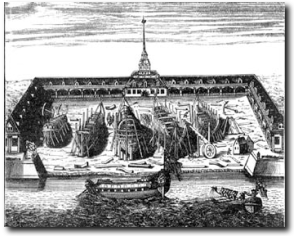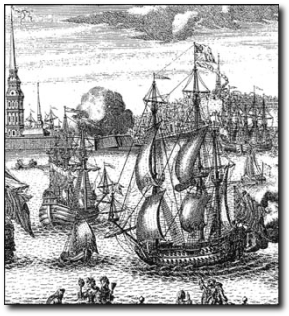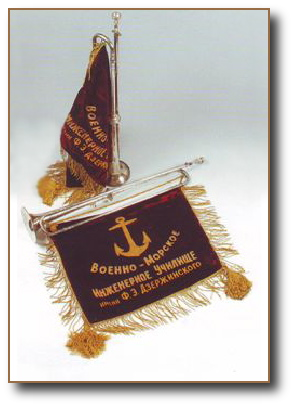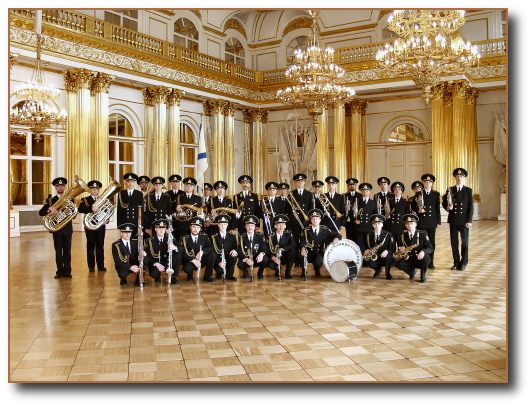 The Oldest Orchestra in Russia
The Oldest Orchestra in Russia
The history of The Admiralty Navy Band of Russia goes back to the time of Peter the Great. Three months before Saint-Petersburg itself was founded, in February 1703, Peter I ordered the draft of twenty-nine singers from the Moscow Royal Choir in order to teach them to play oboes for the Admiralty. The destiny of these musicians is not known for sure, but the most likely version is that the twenty-nine musicians from Moscow were the ones who appeared in Saint-Petersburg a year later. If this version is correct, the birthplace of the Admiralty Navy Band is Moscow.
 In autumn 1704 the General Admiralty Building in the Northern capital was founded. The music of oboes and drums mixed with the sounds of hammers and creak of capstan engines accompanied the construction of the Russian Fleet.
In autumn 1704 the General Admiralty Building in the Northern capital was founded. The music of oboes and drums mixed with the sounds of hammers and creak of capstan engines accompanied the construction of the Russian Fleet.
It seems that the new Navy music was initially rather poorly received, because the Tsar ordered the band to play "an hour before the noon" at the Admiralty building to make the band prepare and practice their performances. However, the task was carried out with such a success that the ordinary exercises turned into daily "before noon" concerts. Later, when the Admiralty tower was completed, the band moved there to perform concerts, which were accompanied by a noon volley of a signal cannon. Such concerts became one of the main sights of old Saint-Petersburg.
By order of Peter the Great on 19 February 1711 (Old Style) the band received official status as The Chorus of the Admiralty Battalion. This order establishing military choruses (as military bands were then called) in the Russian Navy and Army turned out to be a cornerstone in the further development of military wind music.
Until the end of 18th century, there were concerts at the Admiralty tower. But time goes by. During his short reign, Tsar Paul I commenced a rebuilding of the Admiralty under management of Adrian Zakharov. The shipyard was replaced - and the Admiralty Battalion was disbanded. The concerts were stopped for a while. But in Russia there is nothing longer than temporary things. This stop is still present. The new Admiralty building itself was finished only during Tsar Alexander's reign.
 Nevertheless, there is an anniversary for the band connected with the name of Paul I. In 1798, after the Admiralty Battalion was disbanded, a Naval College of Ship Architecture was founded. For the next 200 years the history of the band was connected with that of the College.
Nevertheless, there is an anniversary for the band connected with the name of Paul I. In 1798, after the Admiralty Battalion was disbanded, a Naval College of Ship Architecture was founded. For the next 200 years the history of the band was connected with that of the College.
In the middle of the 19th century the College moved to Kronstadt - a citadel of the Russian Navy. In Kronstadt, N.A.Rimsky-Korsakov, acting as the first Inspector of the Naval Bands of Russia, conducted the Admiralty Band as well as other bands of the Kronstadt port. Nikolay Rimsky-Korsakov organized a massed band of the Kronstadt port and conducted concerts for the benefit of the sick and injured. For those concerts the composer wrote his Variations for Oboe, Concerto for Trombone and Concerto for Clarinet. But, during rehearsals, the great composer didn't like the latter composition and excluded it from the concert program.
The College was still located at Kronstadt during the Disavowal of Tsar Nikolas II, the revolution of 1917. After the revolution, the College was restructured and moved to Saint-Petersburg under the golden capstan of the Admiralty.
Before World War II the Naval College's band was renowned as one of the best in the USSR Navy. In 1938 the band was headed by Colonel G.N. Stepanov and from August 1939 by Colonel S.P. Rotmil (1883-1943). In 1940 he was replaced by a brilliant musician Lieutenant-Colonel A.B. Tsvetkov. From 1950 until 1960 Major S.D. Polansky conducted the band.
From 1960 to 1976, the band was headed by V.M. Barsegian, a very talented conductor and composer. That was a legendary period of prime when the Admiralty Navy Band became the absolutely best in the garrison. Vartan Michailovich Barsegian left to us a great musical heritage which still embellishes the band's repertoire.
The mastery of the musicians and First Sergeant Nathan Vladimirovich Idson, a brilliant clarinet player and band manager who was acted as the band conductor in 1978 to 1985, saw the band through several difficult years.
 From 1985 the band was led by Commander (later Captain) A.A. Karabanov.
From 1985 the band was led by Commander (later Captain) A.A. Karabanov.
Starting in 1991 the Admiralty Navy Band toured in Europe - Belgium, United Kingdom, Germany, Denmark, Spain, Italy, Holland, Finland, France, Sweden, Switzerland - this became the geography of the band's tours.
For their highly professional accompaniment of Queen Elisabeth's II visit to Saint-Petersburg the band was rewarded with a Diploma of Gratitude of the President of the Russian Federation. And during a two-month tour in 1995 the British press called the Admiralty Navy Band "one of the best touring bands of the world".
During celebrations of the 300th anniversary of Saint Petersburg, The Admiralty Navy Band was invited to play in the State Hermitage for more than forty (!) heads of state - the members of the Saint Petersburg Summit. For this performance, The Admiralty Navy Band is rewarded with an Honor Diploma of the State Hermitage. The Hermitage's Director M.B. Piatrovsky said that the Band "is the most cultured military band in Russia."
The Admiralty Navy Band has recorded seven CD's:
 "50 Years of Victory"- 1995
"50 Years of Victory"- 1995
 "Leningrad Reminiscences" - 1998
"Leningrad Reminiscences" - 1998
 "Salute from Saint Petersburg" - 1998
"Salute from Saint Petersburg" - 1998
 "Under the Sign of Eagle" - 2000
"Under the Sign of Eagle" - 2000
 "Music of the Russian Imperial Guard - Vol. 1" - 2000
"Music of the Russian Imperial Guard - Vol. 1" - 2000
 "Music of the Russian Imperial Guard - Vol. 2" - 2005
"Music of the Russian Imperial Guard - Vol. 2" - 2005
 "Music of Russian Glory" - 2005
"Music of Russian Glory" - 2005
The band performed the music of composer V. Panchenko for the film "The Peculiarities of National Fisheries" in 1999.
Also, The Admiralty Navy Band was the first Russian military band presented on the Internet. Since 1997 the band's life has been on-line. In 1998 the Admiralty Navy Band was transferred from the Naval College and once again, as it had been nearly 300 years before, was stationed at the Saint-Petersburg Naval Base.
The many avid listeners of the Band include Queen Elisabeth II of the United Kingdom, Queen Beatrice of the Netherlands and King Karl-Gustav XVI of Sweden. as well as several crown princes and princesses. Prince Nikolai Romanovich Romanov and Prince Mikhail Romanovich Romanov, progeny of the Russian Emperor, are frequent guests at the Admiralty Navy Band concerts.
 The modern Admiralty Navy Band of the Saint Petersburg Naval Base is a highly professional band of naval musicians. It is distinguished by a high performing level, delicate intonation, beautiful sound and endless repertoire. The band plays ceremonial and ancient military music, classical, modern and dance music. The Band's performances in the best concert halls of Saint Petersburg has become a key part of the city's concert life. The Admiralty Navy Band is a permanent participant at the international festivals held in Saint Petersburg, such as "Palaces of Saint Petersburg", "Admiralty Music" and "The Festival of Military Bands".
The modern Admiralty Navy Band of the Saint Petersburg Naval Base is a highly professional band of naval musicians. It is distinguished by a high performing level, delicate intonation, beautiful sound and endless repertoire. The band plays ceremonial and ancient military music, classical, modern and dance music. The Band's performances in the best concert halls of Saint Petersburg has become a key part of the city's concert life. The Admiralty Navy Band is a permanent participant at the international festivals held in Saint Petersburg, such as "Palaces of Saint Petersburg", "Admiralty Music" and "The Festival of Military Bands".
Leading foreign military musicians are invited as guest conductors to perform with the Band:
February 1998 - main conductor of the UK Royal Navy Bands, Commander Richard Waterer, at the Capella Hall - a program of "British Music".
June 1999 - main conductor of the Royal Navy Band of the Netherlands, Major Morris Hammers, at the Grand Philharmonic Hall - a program of modern music for a symphonic band.
February 200 - conductor of the Hamburg Police Band, Christine Kresge, at the Capella Hall - "From Mozart to Jazz" with sololoist Jiggs Wigham from germany on trombone.
March 2002 - main conductor of the Defense Forces of Estonia, Captain Peter Saan, at the Capella Hall - a program of Estonian music "Capriccio Estogniol".
February 2003 - chief conductor of the Royal Navy Band of Sweden, Lieutenant-Commander Andreas Hanson, at the Grand Philharmonic Hall, "Swedes on the Neva River", a 300th anniversary performance.
February 2004 - chief conductor of the Defense Forces of Estonia, Major Peeter Saan, and chief conductor of the Navy Band of Finland, Captain-Lieutenant Timo Kotilainen, at the Grand Philharmonic Hall, The Music of Battles".
March 2004 - Dr. William Malambri of the United staes of America, at the Grand Philharmonic Hall, a program entitled "Nostalgia".
